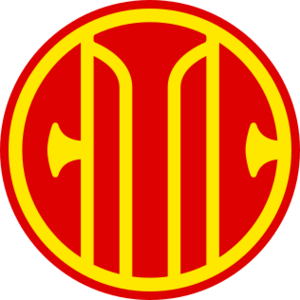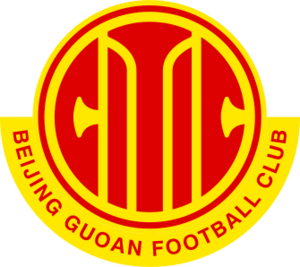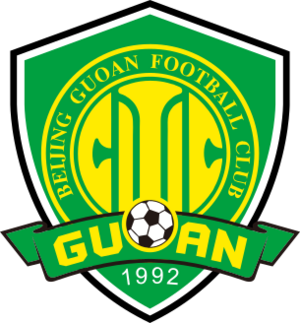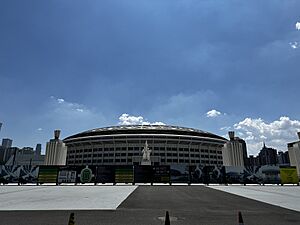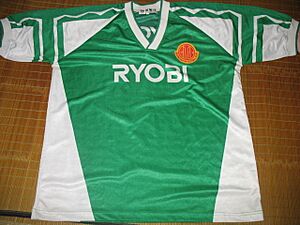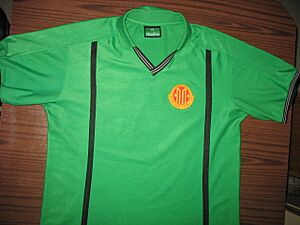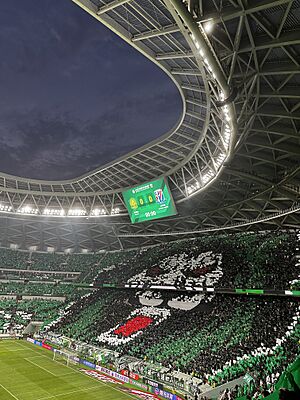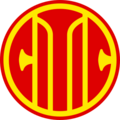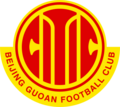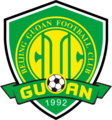Beijing Guoan F.C. facts for kids
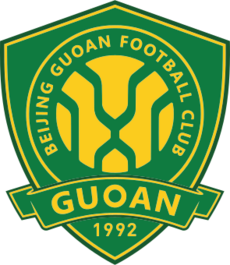 |
|||
| Full name | Beijing Guoan Football Club 北京国安足球俱乐部 |
||
|---|---|---|---|
| Nickname(s) | 御林军 (The Imperial Guards) |
||
| Founded | 29 December 1992 | ||
| Ground | Workers' Stadium | ||
| Capacity | 68,000 | ||
| Owner |
|
||
| Chairman | Zhou Jinhui | ||
| Head coach | Quique Setién | ||
|
|
|||
| Beijing Guoan | |||||||||||||
|---|---|---|---|---|---|---|---|---|---|---|---|---|---|
| Simplified Chinese | 北京国安 | ||||||||||||
| Traditional Chinese | 北京國安 | ||||||||||||
|
|||||||||||||
Beijing Guoan Football Club is a professional football team from Beijing, China. They are also known as Beijing FC in international games. The team plays its home matches at the Workers' Stadium. Beijing Guoan is one of only four clubs that have always stayed in China's top football league since it started in 2004.
The club was first called Beijing Football Club. They won many league and cup titles before becoming a professional team. On December 29, 1992, the club became fully professional. This made them one of the first teams in China's professional league. Since then, they won their first professional league title in 2009. They also won the Chinese FA Cup in 1996, 1997, 2003, and 2018.
Contents
Club History
Early Days: 1950s to 1992
The club started in 1951. The local government wanted to join China's first national football league. They formed a team with the best players from Beijing and Tianjin. This team was called the North China team. They finished fourth in their first season.
In 1955, the Beijing players formed their own club, called Beijing Football Club. They wore white home kits and red away kits. In 1956, their youth team, Beijing Youth B, actually won the league title! Beijing Football Club won the league in 1957 and 1958. They became a very strong team in Chinese football.
Because Beijing was the capital city and the team was so good, many players were chosen for the Chinese national team. This meant the club sometimes used its youth team to play in the league. The youth team even won the championship in 1963. Football stopped in China during the Cultural Revolution in 1966. When it returned, Beijing won the league title again in 1973. They also won league titles in 1982 and 1984, and the Chinese FA Cup in 1985. After a short time in the second division, they returned to the top league in 1990. Before becoming professional, Beijing had won the league title five times.
Becoming Professional: 1992 to 1999
Beijing Guoan was officially formed on December 29, 1992. This was part of a big change to make Chinese football more professional. The club was started by CITIC Guoan and the Beijing Municipal Sports Committee. They joined the first professional top-tier league in 1994. They also changed their home colors to green.
In their first professional season, Beijing finished eighth. Their manager, Tang Pengju, left the club. Jin Zhiyang took over and helped the team finish second in 1995. The next year, Jin Zhiyang led Beijing to their first professional trophy! They won the 1996 Chinese FA Cup by beating Jinan Taishan Jiangjun 4–1. They won the Cup again in 1997. After this, Jin Zhiyang left to coach the Chinese national team. Assistant coach Shen Xiangfu became the new manager. He led the team to third place in his first season.
New Influences and First League Title: 2000 to 2009
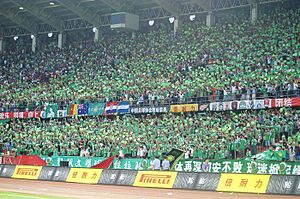
In 2000, Milovan Đorić from Serbia became Beijing's first foreign manager. But he left quickly after losing his first three games. Wei Kexing, a Chinese coach, took over. In 2002, Ljupko Petrović became the second foreign manager.
In 2003, the club changed its name to Beijing Hyundai for a few years because of a sponsorship deal. In 2005, the famous Spanish club Real Madrid even talked about working with Beijing on a football project.
In 2007, Lee Jang-soo from South Korea became the manager. He had won the Chinese FA Cup twice before. In his first season, he led Beijing to second place in the league. By 2009, the club was back at the Workers Stadium after it was rebuilt for the 2008 Olympics. It looked like they would win their first professional league title. But after a loss in September 2009, Lee Jang-soo was replaced by former player Hong Yuanshuo. On the very last day of the season, Beijing won 4–0 against Hangzhou Greentown. This victory made them the 2009 league champions! It was their first professional league title.
Recent Years: 2010 to Present
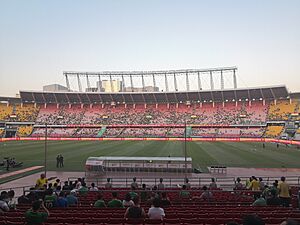
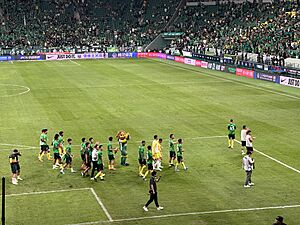
From 2010 to 2016, Beijing Guoan was always a strong team, often challenging for the league title. In 2017, Sinobo Group, a real estate company, became the main owner of the club. They bought 64% of the shares. The club's name changed to Beijing Sinobo Guoan F.C. Co., Ltd. for a few years.
Since 2020, the club has continued to play in the Chinese Super League. They faced challenges like other teams during the COVID-19 pandemic, which affected how games were played. The club's name returned to Beijing Guoan in 2021.
Club Name Changes
The club has had several names over the years:
- 1956: Beijing Physical Education Normal University
- 1957–1960: Beijing
- 1961–1964: Beijing Youth
- 1965–1990: Beijing
- 1991: Beijing Shenzhou
- 1992: Beijing
- 1993–2002: Beijing Guoan
- 2003–2005: Beijing Hyundai
- 2006–2015: Beijing Guoan
- 2016: Beijing Guoan LeEco
- 2017–2020: Beijing Sinobo Guoan
- 2021–Present: Beijing Guoan
Home Stadiums
Beijing Guoan has played in five different stadiums since 1994:
- Xiannongtan Stadium (1994–1995)
- Workers' Stadium (1996–2005, 2009–2019)
- Beijing Fengtai Stadium (2006–2008)
- Rizhao International Football Center in Rizhao, Shandong (2022)
- Workers' Stadium (2023–present)
Team Kits
The team's kits have been supplied by different companies over the years. Umbro supplied kits in 1993-1994. Nike supplied them from 1995-2005, then Adidas from 2006-2009. Since 2010, Nike has been the kit supplier for all Chinese Super League clubs, including Beijing Guoan.
Shirt sponsors have also changed, including companies like Ryobi, CITIC Group, Beijing Hyundai, China CITIC Bank, and JD.com.
Team Rivalries
Beijing-Shanghai Derby
Beijing Guoan has a big rivalry with Shanghai Shenhua. This is called the Jing-Hu derby. It's like a rivalry between the two most important cities in China: Beijing (the capital) and Shanghai (the financial center).
This rivalry became very strong in 1997. On July 20, 1997, Beijing beat Shenhua 9–1 at the Workers' Stadium. This was Beijing's biggest win ever and Shenhua's biggest loss. Soon after, Beijing also beat Shenhua in the 1997 FA Cup final. From 2010 to 2024, Beijing Guoan had an amazing record of twelve straight wins against Shanghai Shenhua at their home stadium.
Jing-Jin Derby
Another local rivalry is the Jing-Jin derby, against Tianjin Jinmen Tiger. Both teams started from the same North China team before they split. They have often played in the top league, leading to intense matches. Sometimes, these rivalries have even caused problems outside the stadiums.
Current Team Players
First Team
|
|
Retired Jersey Numbers
Beijing Guoan has retired two jersey numbers to honor special parts of the club:
- 12 – This number was retired in January 2016 for the club's supporters. Fans are often called the "12th man" because they cheer so loudly and support the team.
- 13 – This number was retired for Xu Yunlong, a club legend. He was a very important player for Beijing Guoan for many years.
Club Achievements
Team Trophies
Beijing Guoan has won many important titles:
- Winners: 2009
- Second Place (4): 2007, 2011, 2014, 2019
Chinese Jia-A League (Older top league)
- Winners (5): 1957, 1958, 1973, 1982, 1984
Chinese FA Cup
- Winners (5): 1985, 1996, 1997, 2003, 2018
Chinese FA Super Cup
- Winners (2): 1997, 2003
Individual Awards
Some players and coaches have won special awards while at Beijing Guoan:
- Jorge Luis Campos (Paraguay): Player of the Year (1997)
- Branko Jelić (Serbia): Player of the Year (2005), Chinese Super League Top Scorer (2005)
- Gregorio Manzano (Spain): Chinese Football Association Coach of the Year (2014)
- Cédric Bakambu (DR Congo): Chinese Super League Top Scorer (2020)
Team Records
Biggest Wins
- Biggest win overall: 9–1 against Shanghai Shenhua (July 20, 1997 – Jia-A League) and 8–0 against New Radiant (August 29, 1997 – Asian Cup Winners Cup)
- Biggest home league win: 9–1 against Shanghai Shenhua (July 20, 1997 – Jia-A League)
- Biggest away league win: 6–1 against Shandong Luneng (August 8, 2007 – Chinese Super League)
Biggest Defeats
- Biggest defeat overall: 0–7 against Kawasaki Frontale (June 29, 2021 – AFC Champions League)
- Biggest home league defeat: 0–4 against Changchun Yatai (September 29, 2012 – Chinese Super League)
- Biggest away league defeat: 0–5 against Guangzhou City (December 19, 2021 – Chinese Super League)
Winning Streaks
- Most consecutive league wins: 10 wins (from March 1, 2019 to May 17, 2019)
- Longest league unbeaten streak: 18 matches (September 28, 2008 to April 17, 2009, and April 17, 2011 to August 17, 2011)
- Longest home league unbeaten streak: 29 matches (September 29, 1996 to April 4, 1999)
Images for kids
See also
 In Spanish: Beijing Guoan para niños
In Spanish: Beijing Guoan para niños


